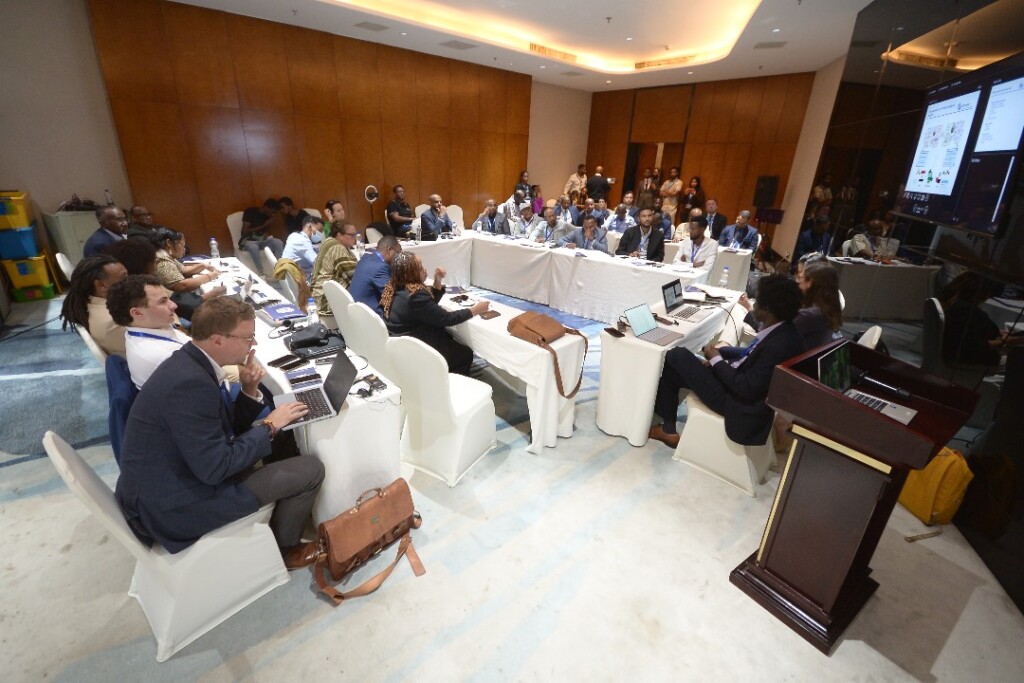Sudanese groups form alliance ‘to stop the war by fighting corruption’

The Sudan Business for Peace conference in the Ethiopian capital on February 27 (Photo: RD correspondant)
Five prominent Sudanese organisations agreed to establish an anti-corruption alliance at the end of the Sudan Business for Peace conference in the Ethiopian capital of Addis Ababa yesterday.
The Sudanese Consumer Protection Society, the Democracy First group, the El Khatim Adlan Center for Enlightenment and Human Development (KACE), the Awareness Organisation, and the Sudanese Journalists Syndicate signed the founding statement of the Sudan Anti-Corruption Alliance, in which they pledged to exert all their efforts “to stop the war by combating corruption”.
The founding statement, obtained by Radio Dabanga, says that the “April 2023 war is due to a culmination of struggles over power, wealth, impunity and the continued plundering of the country’s resources.
After the members of the new alliance “analysed the current situation, we found ourselves facing a real challenge, as Sudan is one of the 10 most corrupt countries in the world. It occupies the 162nd place among the 180 countries listed by the 2023 Corruption Perceptions Index (CPI) Transparency International.
Sudan is “rich in resources, but totalitarian regimes that ruled the country for more than five decades caused the death, displacement, and misery of millions of Sudanese people,” the organisations state.
The signatories of the statement say that they “had to set up this civil alliance, to address the corruption that spread in the body of the Sudanese state and has become a threat to its survival.
“The alliance will work to achieve its vision concerning a democratic Sudan, free of corruption, and where the values of transparency, integrity, accountability and good governance are respected.”
They also agreed to launch an electronic version of the Anti-Corruption Resource Centre in Sudan.
Mismanagement
The three-day Sudan Business for Peace conference that began on February 27, “was a good start for the new independent alliance led by Sudanese organisations which now prioritise anti-corruption efforts and the dismantling of the war economy,” RD correspondent Ashraf Abdelaziz wrote from Addis Ababa.
Economist Bakri El Jak attributed the current crisis in Sudan to the absence of a functioning state, citing decades of economic mismanagement under the former Al Bashir regime. Corruption thrived during this period, with regime leaders “establishing parallel companies controlled by the SAF and the RSF”.
Participants also stressed the importance of considering climate change and its impacts and called for a thorough review of the agricultural structures in Sudan and the financing challenges farmers face. Agricultural experts cautioned about the looming threat of hunger in Sudan.
Hope
“The conference is a source of hope across the business sector,” said the closing statement of the conference. organised by the Centre for International Private Enterprise (CIPE) and partners, and attended by more than 120 businessmen and women, academics, journalists, politicians, and representatives of donors and civil society organisations.
CIPE expressed its “deep gratitude to all participants for their valuable contributions and tireless discussions. “Your vision and commitment during these three days not only highlighted the impact of the war on the Sudanese citizen and economy, but also charted paths towards peace, relief and recovery in the short, medium and long term.”











 and then
and then